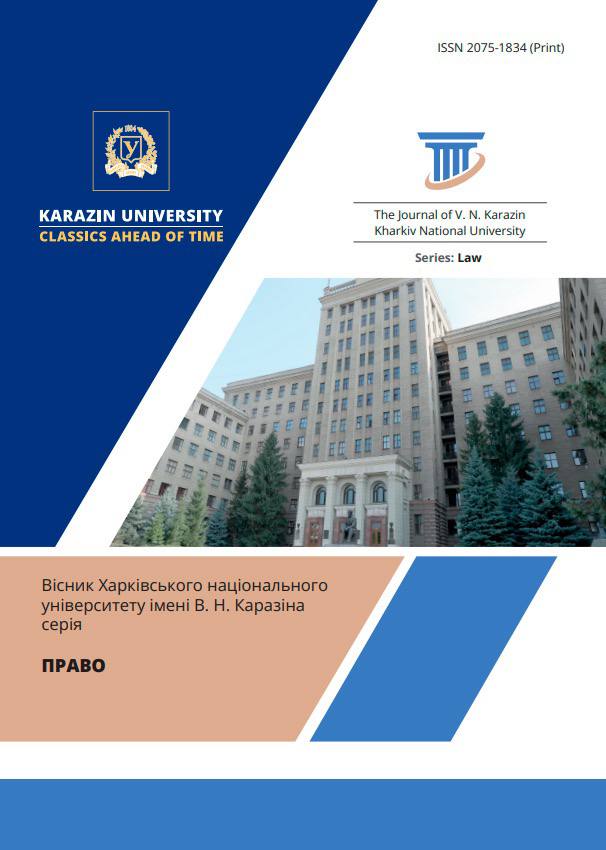ENSURING THE HOUSING RIGHTS OF IDPS: PROBLEMS WITH IMPLEMENTATION AND JUDICIAL PRACTICE
Abstract
Introduction. As of 2024, more than 4.9 million internally displaced persons (IDPs) are registered in Ukraine. These are official data provided by the Ministry of Social Policy. At the same time, international estimates indicate that the number of IDPs may reach more than 7 million, as not all displaced persons are officially registered. That is why the problem of political and humanitarian significance is acute - violation of the rights and interests of internally displaced persons, this causes concern of the international world community. Accordingly, the problem of ensuring the mechanism of protection and restoration of violated legal rights and interests arises. Housing rights are one of the most relevant and most violated for immigrants. This is what determined the topic of this article.
Summary of the main results of the study. The problem of providing internally displaced persons (IDPs) with housing was acute even before the start of the full-scale invasion, especially for the "first wave" of displaced persons since 2014. Many of these people did not have the financial ability to purchase housing or permanently rent it. The majority of IDPs needed long-term housing solutions that would allow them to remain in the territory controlled by Ukraine, to have stable housing and employment opportunities.
Despite this, state programs failed to provide housing for all displaced persons, which left the problem open for many years after the start of the armed aggression in 2014.
The status of internally displaced persons (IDPs) in Ukraine is an extremely urgent issue in the context of the ongoing military conflict and occupation of part of the country’s territories. The legal regulation of the status of IDPs is based on a number of legal acts, including the Law of Ukraine "On Ensuring the Rights and Freedoms of Internally Displaced Persons." One of the key problems is ensuring the IDPs’ right to housing, which is directly related to the state’s fulfillment of its international obligations regarding the observance of social human rights, including the right to housing defined by Article 47 of the Constitution of Ukraine and other normative documents.
One of the key mechanisms for ensuring the right to housing for IDPs is the creation of state and local programs for the provision of temporary or permanent housing. In particular, Article 9 of the Law "On Ensuring the Rights and Freedoms of Internally Displaced Persons" provides for the creation of a temporary housing fund for IDPs, which is provided for a period of up to one year with the possibility of extension. However, this mechanism faces a number of problems in implementation. In particular, lack of funding and limited resources leave many IDPs without housing solutions for long periods of time, especially in regions with a high concentration of displaced people.
The practice of court consideration of decisions regarding the implementation of housing rights of IDPs also states certain problems. In judicial practice, the Supreme Court of Ukraine has repeatedly considered cases related to the realization of the right of IDPs to housing. The key problems facing the state in this matter are insufficient financing of programs, lack of housing funds, as well as a long bureaucratic procedure for obtaining housing. Many displaced people have to wait for a long time for housing issues to be resolved, which puts them in a vulnerable position. In its practice, the Supreme Court also draws attention to violations of the rights of IDPs in cases of eviction from temporary housing without providing alternative options, recognizing such actions as a violation of international standards regarding the right to housing, enshrined, in particular, in Article 8 of the European Convention on Human Rights.
Conclusion. Thus, despite the existence of a legal framework and certain state measures to ensure the housing rights of internally displaced persons, the issue of the implementation of these rights remains open and requires further improvement. Judicial practice confirms the need to strengthen the state’s efforts to solve this problem and intensify cooperation with international organizations for the purpose of financial and humanitarian support for IDPs.
Downloads
References
Механізм забезпечення прав внутрішньо переміщених осіб: національний та міжнародний аспекти / [С.Б. Булеца, О.І. Котляр, Я.В. Лазур та ін.]; за заг. ред.: д-ра юрид. наук, проф. О.Я. Рогача; д-ра юрид. наук, проф. М.В. Савчина; к.ю.н., доц. М.В. Менджул. Ужгород: РІК-У, 2017. 348 с. URL: https://dspace.uzhnu.edu.ua/jspui/bitstream/lib/17480/1/Mechanism%20of%20Providing%20Right%27s%20of%20IDP.pdf
Лахманова Л. О. Забезпечення житлом внутрішньо переміщених осіб / Provision of housing for internally displaced persons. URL: https://ekmair.ukma.edu.ua/server/api/core/bitstreams/b9abbed9-d1d5-46b8-a709-29a3d5a889c3/content.
Кобець М.П. Проблеми забезпечення права на житло внутрішньо переміщених осіб в Україні. Наук. вісн. Ужгород. нац. ун-ту: серія: Право, 2016. Т. 2. Вип. 37. С. 110–113.
Велике будівництво. Програма Президента України. URL: https://bigbud.kmu.gov.ua/.
Литва Л., Казачкова А., Покусай В. Формування стратегічних напрямів політики у сфері забезпечення житлом вимушено переміщених осіб. Вісник Київського національного університету імені Тараса Шевченка. Соціальна робота. 2022. № 8. С. 32–36.
Рішення Одеського окружного адміністративного суду у справі № №420/16003/23 від 20 вересня 2023 року. URL: https://reyestr.court.gov.ua/Review/113600255.
Рішення Європейського суду з прав людини «Сezar and others v. Ukraine» від 13.02.2018 року. URL: https://hudoc.echr.coe.int/eng-press?i=003-5798696-7377628.
Рішення Європейського суду з прав людини «Khlebik v. Ukraine» від 25.07.2017 року. URL: https://hudoc.echr.coe.int/eng-press?i=003-5798696-7377628.
Про забезпечення прав і свобод внутрішньо переміщених осіб Закон України No 1706-VII (ред. від 03.08.2022). URL: https://zakon.rada.gov.ua/laws/show/1706-18#Text.
Copyright (c) 2024 Ярослава Менів

This work is licensed under a Creative Commons Attribution 4.0 International License.




